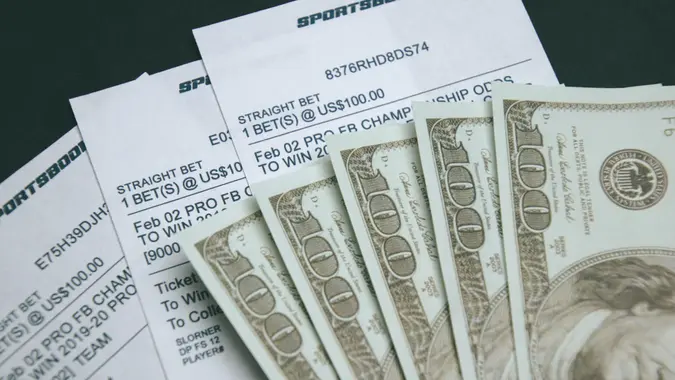Bookmakers make money from taking bets and paying out winning wagers; in return they charge commission on losing wagers.
Bookmakers price markets above their true probability of an event to create an overround, which allows them to profit by overcharging bettors. For example, odds offered for coin tosses are often greater than 2.0 but the real probability is 42%.
They accept bets on a range of events
Bookmakers accept bets on everything from professional sports and political elections, to television specials. Odds are determined through calculations from multiple sources, while bookmakers charge a margin known as vig to cover expenses and make profit (this amount varies depending on which country the bookmaker operates in) while managing lines and balancing books to ensure profitable results for themselves and their clients.
Bookmaker betting margins are calculated as a percentage of the total money wagered on an event, such as coin tosses where both outcomes have an equal chance of occurring. Their purpose is to offer odds which reflect true probability without incurring undue losses from profiteering bookies.
Bookmakers strive to set an optimal market line that will draw equal action on both sides, so that no matter who wins they will still make a profit. This can be difficult as bettors often have individual preferences and information that affects how they place odds. A successful bookmaker will monitor market activity closely, shifting lines accordingly if one team receives more bettors than another; Ogden, the pioneer of horse racing and modern bookmaking industry was noted as taking this approach when setting his ideals lines for bettors to choose between!
They offer a variety of betting options
Bookmakers provide bettors with various betting options to meet the needs of all kinds of bettors, from win and place bets to accumulators – the latter involves making multiple bets during an event so as to generate profit regardless of which team or player wins – popular among horse racing and football bettors alike. Dutching at different bookmakers can yield profits, though be mindful of any risk involved with this strategy before investing your funds.
Bookmaker profits depend on the margins they create in markets, which is defined as the difference between their price and true probability of an outcome – this is often known as an overround. For instance, coin tosses have an equal chance of landing heads or tails, yet bookmaker odds will often exceed 100% – this creates an overround.
By employing pay-per-head software, bookmakers can adjust their betting odds in response to events which impact on the likelihood of particular outcomes, thus increasing or decreasing prices and increasing profitability while at the same time offering greater flexibility than rigid competitors. This makes them more attractive to punters.
They charge a commission on winning bets
Bookmakers, or bookmakers’ commission, is known as “vig” or juice. The amount varies according to betting market type and location – for instance Matchbook charges a flat 2% fee on all bets placed by players from UK/Isle of Man players.
Bookmakers use more than just winning bet charges to attract customers and reduce losses. Bookies often adjust odds in order to draw customers in by increasing those events with multiple bets while decreasing those with few, so as to maintain consistent profit regardless of what outcome each particular bet takes.
Bookmakers also monetize themselves through offering bonuses to bettors who pick the correct team in a multiple bet. For instance, bookmakers might offer bettors who select four winners a 25% bonus on such bets because the chances of picking just one victorious team are much lower than selecting an entire set.
Bookmakers also set the odds of a game by mandating that the more heavily favored team win by more points than its less-favored opponent, as is often done in American and Canadian football – wherein order to ensure equal payout to backers of both sides in a match-up, more heavily-favored side must win by at least 10 points!
They accept bets from all over the world
Bookmakers, often known as bookies or turf accountants, take bets from customers at agreed-upon odds, and pay out winnings at specified odds. Bookmakers offer betting markets such as professional sports, casino games, political events, novelty bets and novelty bets; some operate legally while others act as offshore companies.
Key to any profitable bookmaker business is minimizing risk by managing bet losses. They do this through either changing odds to make bets more profitable, or by laying off bets when they exceed certain liabilities thresholds. Bonuses offered for multiple bets – for instance 25% bonuses when wagering multiple yankee bets – also contribute significantly towards managing these risks and keeping profit margins intact.
Sports betting has quickly become a widespread pastime in the US since legalisation by the Supreme Court last year, following which numerous bookmakers expanded operations and opened offices globally. But this industry presents many unique challenges, requiring highly specialized skillsets in order to operate effectively.
Horse racing betting in the UK is by far the most popular form of wagering, and online betting has catalysed significant growth since its introduction. Football and other niche bets have created competition; nonetheless, making money through sports betting remains possible, so long as one uses discretion when finding value bets.












More Stories
The Impact of Legalized Sports Betting on the Casino Industry
The Psychology of Betting – Why We Love to Gamble
What You Need to Know About Casino News